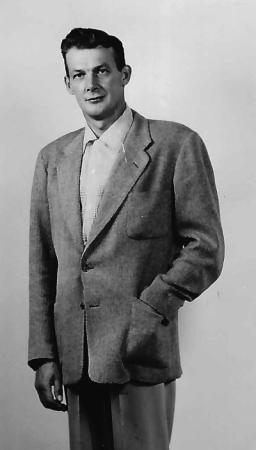Llewellyn "Lew" Keehn
Llewellyn "Lew" Keehn
July 23, 1916 - March 26, 1999
Born in the small hamlet of Silver Lake, Minnesota, Lew Keehn moved to eastern South Dakota as a child. After graduating from Flandreau High School and attending Eastern State Teacher’s College in Madison, Lew went on to serve in the US Army Air Corp between 1941 and 1946, where he achieved the rank of captain. In 1946, he went to work for the South Dakota Department of Employment Security in Yankton.
It was then that Lew decided Deadwood had the kind of economic opportunities he wanted. In the early 1950s he moved his young family to a house on Lincoln Avenue and immediately became a community fixture. In 1953, the local Jaycees named Lew Man of the Year. He belonged to the Elks, the VFW, and the American Legion. When a wind-fueled fire devastated the surrounding hillsides and threatened to burn Deadwood in September 1959, Lew arranged to feed the firefighters working to protect the town.
In 1963, Lew bought the Old Style Saloon No. 10 on Main Street. In the years that followed, Lew worked hard to boost the profile of Deadwood and the saloon among visitors. He effectively turned his bar into a monument to Deadwood’s rough-and-tumble past, filling it with historic photographs and local artifacts. To this day, the saloon often markets itself as “the only museum in the world with a bar.”
He was heavily involved in the Days of ‘76 Rodeo, and after becoming fascinated with the story of Colorado Charlie Utter, Wild Bill Hickok’s traveling companion, Lew created the annual Charlie Utter Days celebration. He recognized the significant economic potential of the Sturgis Motorcycle Rally when it was still a relatively small niche event. Motorcyclists were naturally attracted to his saloon - an affinity that quickly caused Lew to make a difficult decision.
“His mind was made up one day in early June when a motorcycle gang of the Galloping Goose stepped into the bar and basically cleared out all of the families,” remembers his daughter Louie. “He told them he wouldn’t allow colors and actually sat guard all night at his favorite front table window waiting for them to try and come back in. We still have the policy in place today.”
Summers brought plenty of tourists eager to spend money, but winters were tough. Lew thought that snowmobiling would bring more visitors in the off season, and to help the sport catch on, he opened the Kat House, the first Arctic Cat dealership in South Dakota.
Lew recognized that legalized gambling could be a major economic driver for the town and became one of the earliest voices to support the town’s push for limited-stakes gaming, which was finally legalized in 1989.
An avid reader and amateur historian, Lew spent his later years traveling with his wife Marion in their RV, visiting historical sites and hunting in antique stores for artifacts and treasures to bring back to the saloon.
Lew died in 1999 at the age of 82. His descendants continue to own and operate the Old Style Saloon No. 10.

